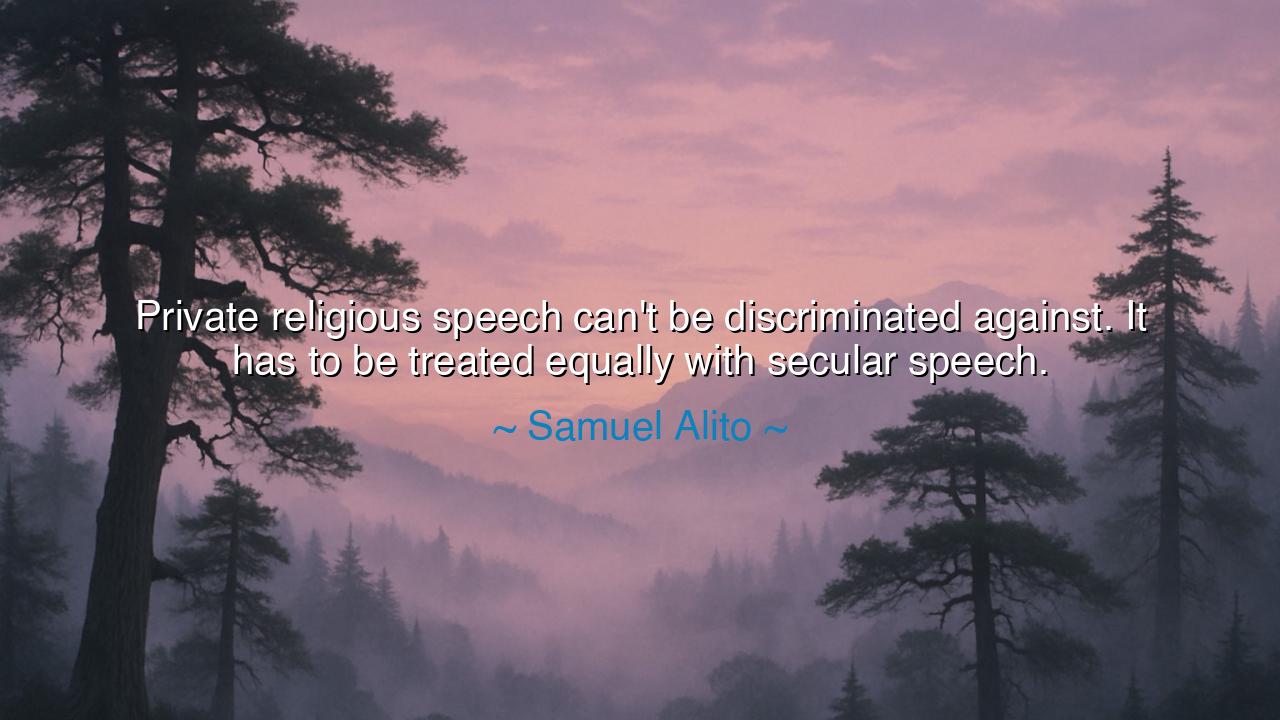
Private religious speech can't be discriminated against. It has
Private religious speech can't be discriminated against. It has to be treated equally with secular speech.






The words of Justice Samuel Alito—“Private religious speech can’t be discriminated against. It has to be treated equally with secular speech”—echo with the ancient call for balance, fairness, and freedom of conscience. These words speak not only of law, but of the soul of liberty itself. For the right to speak one’s truth, whether born of faith or philosophy, is the flame that keeps freedom alive. Without it, the marketplace of ideas becomes a hall of mirrors where only one reflection is permitted, and all others fade into silence. Alito’s declaration, though uttered in the chambers of justice, belongs to the ages—it is a shield for the sacred right to believe, and to speak that belief without fear.
In every age, the battle for freedom of speech and freedom of belief has been waged not in the courts alone, but in the hearts of humankind. Empires have risen proclaiming tolerance, only to fall to tyranny’s whisper: that one creed, one voice, one truth must reign supreme. Yet the divine spark within humanity cannot be commanded. The private religious voice—the prayer spoken quietly in the home, the conscience guiding one’s deeds, the humble words of faith shared in friendship—belongs to no government and bows to no crown. To silence that voice is to chain the spirit itself.
Consider the story of Roger Williams, founder of Rhode Island in the seventeenth century. Cast out of Massachusetts for his belief that the state had no right to govern the soul, he fled into the wilderness, seeking refuge among native tribes. There, he built a settlement founded upon freedom of conscience, declaring that no man should be punished for his faith. His vision was radical for its time, yet it became a cornerstone of American liberty: that belief and disbelief alike are protected, that religion and reason stand as equals before the law. Justice Alito’s words flow from that same ancient spring of wisdom, carried through centuries of struggle and sacrifice.
To treat religious and secular speech equally is not to favor one over the other, but to recognize the shared dignity of all expression. The poet, the scientist, the priest, and the skeptic each hold a fragment of truth; the harmony of a free society lies in allowing all their voices to sound. When the faithful are forbidden to speak because their words rise from the sacred, while the skeptic may speak freely because his arise from the temporal, justice becomes hypocrisy dressed in reason’s cloak. True freedom, Alito reminds us, demands neutrality before belief, so that conviction may be guided by conscience, not decree.
The ancients understood this balance well. In the agora of Athens, philosophers spoke of gods and of logic; neither voice silenced the other. In Rome’s twilight, Christians prayed in catacombs, preserving their faith when law denied it. And in later centuries, reformers, mystics, and visionaries risked exile, flame, and death to preserve the simple truth that the human heart must answer first to what it believes is right. These were not merely struggles of religion, but struggles for the sanctity of the individual soul—the right to speak what one holds sacred, without fear of persecution or prejudice.
The lesson of Alito’s words, then, is not one of division, but of reverence for diversity. Equality of speech does not demand agreement—it demands respect. If we wish to preserve freedom’s fire, we must guard it even for those whose light we do not understand. The same law that protects the sermon must protect the skeptic’s laughter; the same liberty that shields the believer must shelter the doubter. For the moment we silence one, we endanger all.
Let us therefore walk wisely in this teaching. When we speak, let it be with both courage and humility—courage to stand for our beliefs, humility to allow others to stand for theirs. When we listen, let us listen not for offense, but for understanding. And when we defend liberty, let us defend it not only for ourselves, but for those whose faith, whose philosophy, or whose silence differs from our own. For only then shall we be worthy heirs of freedom’s legacy.
Thus remember: the right to speak one’s faith is not a privilege—it is the lifeblood of liberty itself. When the world grows cold with indifference, let us rekindle it with respect; when fear breeds silence, let us answer with courage. For in a land where every voice—sacred and secular alike—may rise without fear, there the spirit of true equality shall forever dwell.






AAdministratorAdministrator
Welcome, honored guests. Please leave a comment, we will respond soon